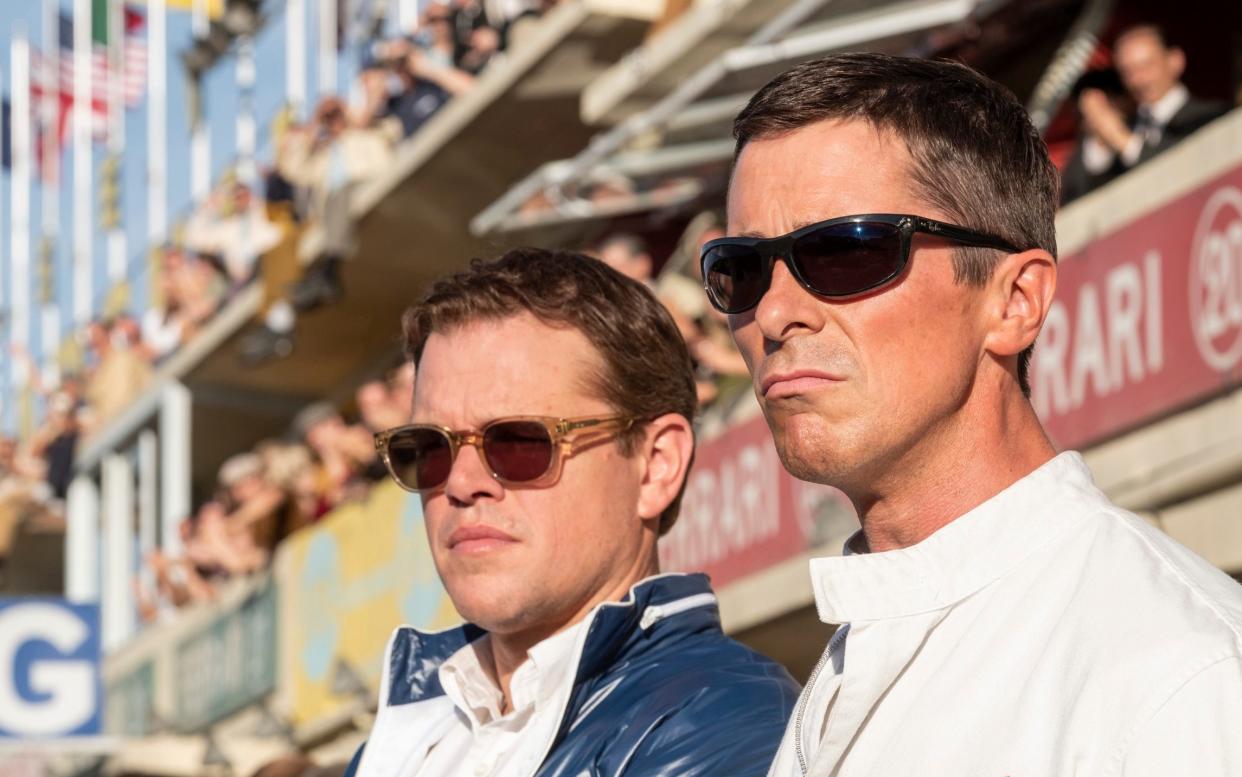Le Mans '66 review: Matt Damon and Christian Bale's Ford vs Ferrari film will be catnip for petrolheads

Dir: James Mangold. Starring: Cast: Matt Damon, Christian Bale, Caitriona Balfe, Jon Bernthal, Tracy Letts, Josh Lucas, Noah Jupe, Remo Girone, Ray McKinnon. Cert 12A, 152 mins
Le Mans ’66 – to be released in the US as Ford vs Ferrari – is about men, cars, and men crying in cars. The first tears emanate from Carroll Shelby (Matt Damon), the future designer-entrepreneur whose racing career came to an end with victory in Le Mans ’59. It’s a visually unsettling intro: having been set on fire during a pit-stop, Shelby is blinking away so much mixed emotion that the finish line becomes a dark blur he crosses almost obliviously.
Masculinity, and all its terrors, are much on this film’s mind for the ensuing two-and-a-half hours – catnip for petrolheads. Others may approach this shiny carousel of a picture with more caution, but it’s luxuriantly mounted in an old-fashioned way, almost to the point where you squint for a moment and can see Steve McQueen and Paul Newman squaring off on the asphalt.
Damon’s actual counterpart – but not antagonist – is Christian Bale, as the British-born racer-engineer Ken Miles. Generously divided between these two, James Mangold’s film looks at their combined efforts to hand the Ford Motor Company its first win at Le Mans in ’66, ending a smug six-year run of Ferrari victories with a show of American industrial might, and aiming to give Ford a vital PR boost during a dismal slump in its fortunes.
As a character study, co-written by Jez and John-Henry Butterworth with Jason Keller, the film has plenty going for it. Where Shelby, popping heart pills under his black Stetson, seems to be fending off a mid-life crisis, Miles is a point-scoring maverick with a cheeky Brummie-ism for every occasion, and loves telling customers at his fix-up shop exactly which crummy car would suit them down to the ground. (Jeremy Clarkson will cackle.)
Bale charges in with one of those big, high-impact performances of his: tilting his chin defiantly at the sky more often than strictly necessary, and exclaiming “bluddy ’ell!” whenever a brake fails or Ford give him lousy instructions. Unsurprisingly for a film about motor racing – an obsession passed down exhaustingly from one male generation to the next – there’s plenty of stuff about fathers and sons: ever-promising Brit Noah Jupe (A Quiet Place) puts in another good showing as Miles’s eager lad, Peter. And Tracy Letts leads from the gut with a grand, contemptuous supporting turn as Henry Ford II, squeezed for a top-speed test run into the GT40 he’s just paid $9m for, and promptly bawling his eyes out about his late daddy.
Mad Men devotees will sense an obvious debt, too. There’s a well-written sideshow when Jon Bernthal’s Ford crony – he and an oleaginous Josh Lucas have perfect faces for the Sixties – is dispatched to Maranello to do a deal with Enzo Ferrari (a wily Remo Girone), who senses subterfuge and drenches Bernthal with Italian insults like stringy mozzarella. The film isn’t remotely going for even-handedness – it barely names the Italian drivers – but mainly in boosterism for the mythology of American motorsports, as well as some pop psychology about what happens to a man inside when the tachometer tips over 7000rpm.

On this score, it gets a little cheesy, with Mangold and his writers groping pretentiously for their fairly obvious themes. Rather like with the DiCaprio-Pitt dynamic in Once Upon a Time in Hollywood, Damon’s good at showing us the vulnerable flip-side to Bale’s wolfish egotism, and their performances rub together strongly enough without forcing the friction: a punch-up and farcical scuffle on the front lawn is cringeworthy because it’s doubly out of character, a scene neither of them plausibly sells.
More to the point, the film lacks speed – we’ve got a whole 24 hours of Le Mans to get through, people! – and can feel like an indulgent rummage in car-history ephemera, albeit a smart, colourful and certainly expensive one. If you love the idea of that, strap in.
Subscriber reward: Click here to save up to 40% on tickets at more than 250 cinemas across the UK


